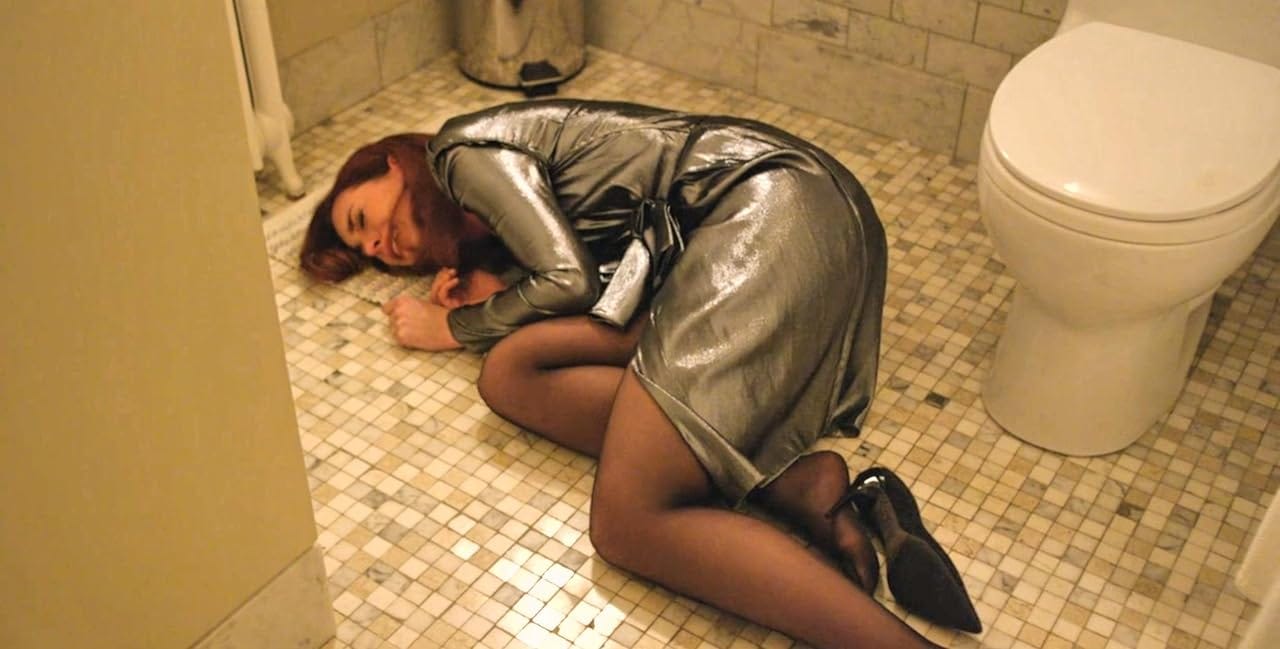Take me as I am, whoever I am.
On what the television show "Modern Love" got right about depicting Bipolar Disorder in the media.
Disclaimer: I am spoiling the hell out of this episode throughout this piece. So, if you’d rather watch it first, it is from Modern Love, Episode 3 on Amazon Prime. It is worth a watch and this is worth a read so do both in whatever order you choose.
I have never, before or since, seen a more accurate depiction of a character with Bipolar Disorder 2 than Lexi in Episode 3 of Modern Love, “Take Me As I Am, Whoever I Am.” The first time I saw a clip of it on social media was when someone posted the scene where she finally admits to a coworker and friend that she has it and remarks, through tears, that finally sharing this with someone else “feels like an elephant has taken one of his feet off of my chest.”
I cried then. I cried watching the full episode. I cried again rewatching it to write this essay. And I’ll likely cry anytime I talk about how beautifully done the portrayal was. I felt so seen, and if you know anything about me you know that I greatly value feeling seen. I ran from my Bipolar Disorder diagnosis for so long because of stigma induced mainly by the media portrayal of this illness and I am so grateful for this depiction.
When you think of someone with Bipolar Disorder, your first thought is likely of someone violent, erratic, “off their meds”, unreliable, down on their luck, a burden to everyone around them, and so on. Very rarely do you think of or see people like Lexi. People like me. Those of us masquerading as “fine.” Often growing up the star, high-achieving, creative student who sleeps too much and maybe talks too loud, starting the life of masking early. She then progresses into the hot shot with a visibly great job and life and seems to be a joy to people who instantly meet her while silently struggling and dying inside.
The creators of this show got so many things right with their portrayal that I had to share.
Hypomania feels like euphoria.
The episode opens with Lexi filling out a dating profile, wondering how to talk about the fact that she has bipolar disorder. We cut to her walking around the supermarket incredibly overdressed, dancing through the aisles, and talking fast to the man she meets, Jeff. Hypomanic episodes, especially those following a deep low, can make us feel like we’re suddenly cured. As if the days, weeks, or months of continuous depression we’ve been feeling are all in our heads or a thing of the past. We’re more carefree, joyous to be around, and everything just feels “right” with the world.
Finding the right treatments is exhausting, but possible.
We see Lexi in a flashback montage of sorts, recounting the timeline of her disorder. She remarks that she’s been through countless doctors and professionals, treatments and medications, and has even tried electroshock therapy (something I am seriously considering myself, side effects be damned.) There is no cookie-cutter plan to treat this condition and no two people experience it the same way. Some people can manage unmedicated, some need a cocktail of pills to stay stable. There are even people who are treatment-resistant and have to suffer indefinitely or find more extreme ways to stay sane.
At the end of the episode, Lexi remarks that she’s “fond of” her pills and her new doctors and has found her stride with her new treatment plan. It's a strenuous journey, but deciding to get on medication was a life-saver for me and I’ve recently started a new antipsychotic after being unmedicated since early 2023.
We don’t sleep enough or sleep too much.
“You seem crazy energized,” Jeff says to Lexi upon their meeting early morning in the grocery store. Lexi responds that she’s “been up for a couple of nights” and that “it's hard to sleep sometimes.” One of the worst parts of having bipolar disorder is that sleep disturbance is a common symptom, yet poor sleep exacerbates other symptoms and can intensify mania. While hypomanic it is easy to stay up for two or three days at a time, not needing sleep or unable to sleep unassisted. I currently use cannabis and Trazadone to help me sleep. On the opposite end, during depressive episodes, we can sleep entirely too much—unable to find the energy to exist.
Episodes are not always triggered and can come unexpectedly.
After Lexi’s day is over, she returns home and begins to settle into her evening. We suddenly see the expression on her face go blank and hear her narrate the quote below. She slowly makes her way to her bed where we see that she stays for days as the sun rises and sets on her rotting peaches.
“And this is where the problems start, I don’t know what kicks it off. Blood sugar, chemical, psychological, who knows? But it comes. Like a monster from an old black and white movie walking and no matter how fast you run, he keeps up with you. And there’s only one place he can’t find you.”
As my mental health declined in recent years, I grew more reluctant to schedule things or commit to events too far in the future because of the unpredictability of my mood episodes. Especially while hypomanic. I can agree to save the world on Monday because I believe that I can and have the energy to. But on Wednesday I can find myself unable to move from the couch or my bed, wanting to not exist in the deep sadness I am experiencing, and lamenting over the fact that I agreed to go out and catch up with a friend.
During this episode, we see that Jeff, the man she met, calls and is confused by her being the total opposite of the woman he met a few days earlier—despondent, uninterested, and bleak—confusing him. He’s so confused that he jokingly asks if she has a twin. The scene is painful to watch because I’ve been there. Not wanting to cancel or disappoint, but also being a huge disappointment and terrible company because I wasn’t honest about how I was feeling at the moment.
Impulsive urges often give us no time to think about our actions before doing them.
In another scene, Lexi wakes up from depression to a perfect morning when she is feeling better, again hypomanic. She contemplates whether 6:30 am is an appropriate time to call Jeff to apologize for being so “off” and she immediately decides to do so telling him that she doesn’t want to waste another day not knowing him. During this call, she invites him over to her place to make up for their tragic date.
When I am hypomanic, thoughts about what others think or the consequences of my actions are not heavily considered—if thought about at all. I can do all the things and make up for the month I spent sad, and I make more daring decisions than I would have while depressed or stable.
We can’t just snap out of it.
Lexi proceeds to spend the day excitedly cleaning her entire apartment in preparation for her makeup date with Jeff. “I gotta clean the bipolar out of this place,” she says before beginning. After she is finished we cut to a scene in the bathroom where she is putting the finishing touches on her makeup. We see her look into the mirror as she realizes she is sad, just as the buzzer to her apartment sounds, signifying that Jeff has arrived for dinner. She begins to cry and beg herself to get it together and not fall apart. As the doorbell continues to buzz and eventually stops, we see her repeating “come on come on come on” before falling to the floor in sobs, completely defeated.
“I am feeling incredibly low, so low that I can barely move, I am impossible to be around, I can barely answer the phone, I am totally unreliable as a friend, in some ways i’m probably the worst friend you can ever have”
A traditional 9-5 is hard for most people with this.
At the beginning of the episode, we see Lexi stroll into work around 10 am and is gently reprimanded for repeatedly missing days of work and being late, even while achieving great success. Lexi narrates that this happens often, going from one job to another because the highs and lows make sticking to a work schedule incredibly difficult. Later in the episode, we see her carrying her things out of work after being fired, presumably from poor attendance.
Fortunately for me, as a consultant in the tech industry for eight years, I worked on flexible teams that didn’t track whether I strolled into the office exactly at 9:00 am or on the dot each morning or not, and I often did not. Mornings were especially hard. Getting myself prepared to go into a job I hated while already feeling completely miserable made sticking to an early schedule quite difficult. I am fortunate to not have had a difficult time keeping a job, but keeping up with my tasks is often an exhaustive feat. I did, however, leave my consulting career because the demands and culture did not align with my needs and contributed to my mental decline.
Talking about our experiences with others is healing for us.
After being fired, Lexi’s coworker can tell that something more is going on and asks her to get coffee where Lexi eventually admits that she has Bipolar Disorder. The coworker responds beautifully, giving Lexi her full attention to vent, asking her questions, and she even remarks that she is glad Lexi told her and that it explained why she was having so much difficulty connecting with her.
We then see Lexi call various friends, coworkers, and lovers of the past to tell them about her diagnosis and apologize for things she’s said or done, or for disappearing completely. She is relieved to find that the majority of folks are understanding and glad to hear from her and get an explanation. She resolves to never hide her diagnosis from anyone again to give people, and herself, more opportunities for understanding, accommodations, and grace.
Before becoming vocal about my mental health struggles publicly, and letting more people into my daily experiences, I always felt like I was masquerading as a “normal” person. To the outside world, I was fine, and only I knew I was dying inside. I’m so glad that, years later, I am now open and honest with nearly everyone I meet (sometimes a bit too much) and even strangers on the internet, about the ways that I struggle. It’s freeing. And I don’t plan to stop anytime soon.
“And I promised myself no person would not know the full story of me, the good, the bad, and the mad.”
Dating & Mental Health
If you would like to hear my thoughts on dating and mental illness, I was a guest host on Listen To Your Single Friend for Episode 24, “Dating & Mental Health.” I talked about navigating disclosure, recognizing the signs in your partner, and rejection. Note that the interview was a few years ago and my dating life looks completely different than when I was on the episode. So if you listen in and want to know if any of my thoughts have changed since then, feel free to reach out!
Thank you for reading ‘here comes the sun.’
A special shoutout to my paid subscribers, I appreciate you all SO much! — GG, Yetti, Jaydeen, Natazah, Erica, Sharie, Melanie, Amara, Rahima, and Mariah.
If you would like to support another way outside of a monthly or annual subscription feel free to:
Share this or any other post with someone who may need it.










I watched "Modern Love" and found it to be such an eye-opener, it was my first time witnessing a comprehensive and detailed media depiction of bipolar. So grateful to see that you were able to be moved and affirmed by it. This piece was beautifully written and I'm so thankful that you've shared how it spoke to you <3
Thank you for sharing this, Ashleigh! I hadn't heard of this show, but after reading this, you can best believe I'm about to text my mama for her amazon password.
As someone who struggles with mental illness, it's nice to see mainstream media showing it in a more compassionate way and painting a picture that allowd you to see how varied it is. When I think about how I've both been an advocate for mental health, but also denied my own feelings, I consider how media has played a part in my internalized ableism.
Sending you lots of love and I'm going to check out that podcast!